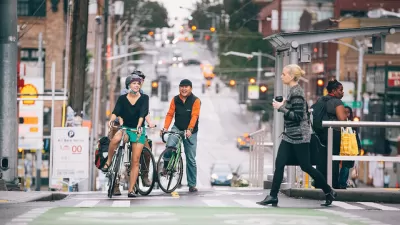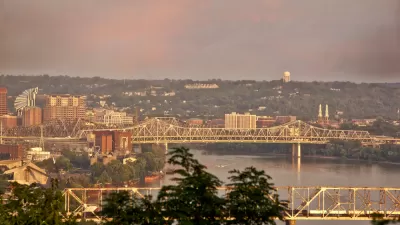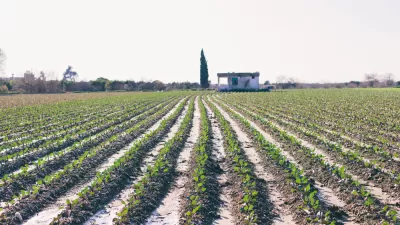Conservatives and libertarians who admonish government spending and transit subsides still support new road and highway construction, and the state power and funding they typically require.
Author and commentator Alex Marshall argues that the current pro-road position of many conservative and libertarian groups doesn't seem to match with their anti-government stance.
"The ancient Romans had a saying: To make a road straight, you need to make someone's neck crooked.
This chilling refrain is a vivid summing up of an obvious fact: Building a road is a manifestation of power, particularly state power. Carving a road across multiple jurisdictions and property lines - not to mention varying terrain - can be done only by an institution that can override the wishes of any one individual.
This was true in the days of the Roman Empire, when mighty roads were built so well that many of them still exist. And it's true today. In the exercise of that authority, local, state and federal governments spent more than $150 billion on roads in 2005, according to the most recent federal Highway Statistics report. That's comparable to what we spend annually on waging war in Iraq.
Given all this, I find it exceedingly strange that a group of conservative and libertarian-oriented think tanks - groups that argue for less government - have embraced highways and roads as a solution to traffic congestion and a general boon to living. In the same breath, they usually attack mass-transit spending, particularly on trains. They seem to see a highway as an expression of the free market and of American individualism, and a rail line as an example of government meddling and creeping socialism."
FULL STORY: King of the Road

Manufactured Crisis: Losing the Nation’s Largest Source of Unsubsidized Affordable Housing
Manufactured housing communities have long been an affordable housing option for millions of people living in the U.S., but that affordability is disappearing rapidly. How did we get here?

Americans May Be Stuck — But Why?
Americans are moving a lot less than they once did, and that is a problem. While Yoni Applebaum, in his highly-publicized article Stuck, gets the reasons badly wrong, it's still important to ask: why are we moving so much less than before?

Using Old Oil and Gas Wells for Green Energy Storage
Penn State researchers have found that repurposing abandoned oil and gas wells for geothermal-assisted compressed-air energy storage can boost efficiency, reduce environmental risks, and support clean energy and job transitions.

Minneapolis Bans Rent-Setting Software
Four cities have enacted restrictions on algorithmic software that can inflate rent costs.

Oakland to Add 244 New EV Chargers
Oakland plans to launch its new charging network at eight locations by the end of 2025.

Jane Goodall Inspires with Message of Hope, Resilience, and Environmental Action
Speaking in Pasadena, Jane Goodall offered a hopeful and inspirational message, urging global compassion, environmental responsibility, and the power of individual action to shape a better future.
Urban Design for Planners 1: Software Tools
This six-course series explores essential urban design concepts using open source software and equips planners with the tools they need to participate fully in the urban design process.
Planning for Universal Design
Learn the tools for implementing Universal Design in planning regulations.
Heyer Gruel & Associates PA
City of Moreno Valley
Institute for Housing and Urban Development Studies (IHS)
City of Grandview
Harvard GSD Executive Education
NYU Wagner Graduate School of Public Service
City of Cambridge, Maryland
Newport County Development Council: Connect Greater Newport





























